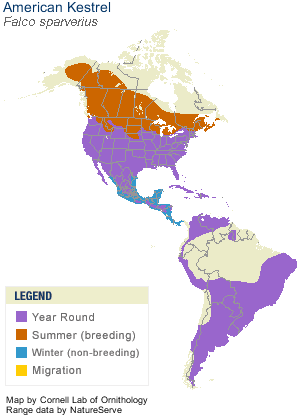
 American Kestrel
American Kestrel
Falco sparverius
Education birds representing this species: Monty and Skylar - (Alumni: Killy and Spring)
Interesting Facts:
- Smallest diurnal raptor in North America
- Once known as the Sparrow Hawk
- Closely related to the Peregrine Falcon
Physical Dimensions:
- wing span ~2 feet
- weight ~6 ounces (females slightly larger)
Prey (versatile, opportunitistic, benefits farms - reduces pests)
- prefers large insects, crickets - preys on others after frost hits
- lizards
- mice voles
- snakes
- amphibians
- small birds in flight (less than 2 ounces) including sparrows (hence formerly known as sparrow hawk)
- almost never feed on carrion
Hunting Techniques:
- From elevated perches or hover-hunting (for small mammals)
- Prefers to hunt in short grass
- Maintains exclusive hunting territories in winter (so larger females occupy best sites)
Range:
- Most of North America
- Avoids spending winter in snow-vovered areas because it's difficult to find prey
- Migrates only when necessary

Color:
- Demonstrates sexual dimorphism (when males and females differ in coloring). Sexual dimorphism is unusual in raptors.
- Males: rusty backs, blue wings/cap, bright red tail with dark band near the tip, white/red chest with black spots.
- Females: reddish brown backs with dark broken barring, heavily streaked creamy chest, 10% larger than males.
Reproduction:
- Monogamous, but usually do not pair for life. Court and pair again each spring.
- Males attract mates with aerial flight display and offering prey - males provide food to females during reproduction.
- Nest in tree cavities and protected ledges ~15-30 feet above ground with an opening 2-4" in diameter
(tree holes, former flicker/woodpecker holes, partically enclosed ledges, nest boxes) - Does not build a nest - lays eggs directly on surface in its cavity.
- "Builds" a nest mid April-June in open areas just at the edge of woods
3-5 eggs at 1-2 day intervals
29-30 days of incubation
Fledged at 4 weeks
independent from parents at ~8 weeks old
Conservation:
- No conservation issues.
Links of Interest:
- Nestboxes for American Kestrels - from www.hawkmountain.org
- Article in The Conservationist - Fall 2014 issue The Littliest Falcon